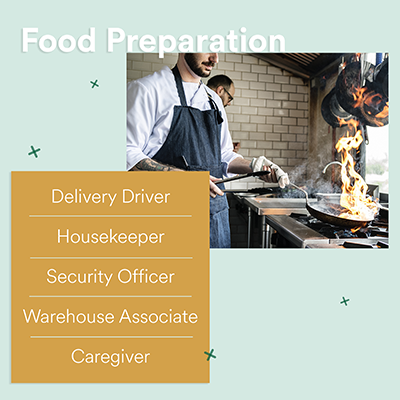The American workforce has been plagued by the threat and reality of furloughs, salary cuts and layoffs for the last several months. Certain industries and roles are under extreme amounts of stress, and it’s hard for business owners to keep their employees and stay afloat. This uncertainty has been a challenge for employers and job seekers alike. As the economy tentatively starts to re-open and more companies feel safe hiring employees, the candidate pool looks different than before.
Let’s take a look at some of the positions with the steepest drop in employment during the pandemic, from February 2020 to May 2020:
- Retail clerks (mainly in clothing and furniture stores): 53% of jobs lost
- Dental office staff: 53% of jobs lost
- Film and TV production specialists: 48.5% of jobs lost
- Food servers and waiters: 48% of jobs lost
- Performing artists: 45% of jobs lost
- Cooks and chefs: 44% of jobs lost
- Hospitality and overall front-desk staff: 42% of jobs lost
- Air transportation workers: 39% of jobs lost
- Real estate and property management specialists: 38% of jobs lost
- Bureau of Labor Statistics, June 2020
We have a message for employers – don’t ignore candidates with less traditional career paths or experience. Throw those old biases out the window! Candidates are more than their resumes and job titles, and we’ll show you how!
Many positions do not require a master’s degree or even a four-year college degree. Employees can develop hard skills on the job or with specific online courses or trainings. What’s more important now than ever are soft skills. Soft skills are transferrable and are much harder to teach.
Think about it, with more people working from home than ever before and utilizing technology to work, digital literacy and effective communication skills are crucial. Not to mention, it’s likely most people will have gaps in their resumes if they were laid off due to the pandemic. Your ‘ideal’ candidate probably looks much different now. The market is flooded with these kinds of candidates so employers must look at hiring much different now than they used to before.
When you’re hiring, look out for these career transition-friendly soft skills:
- Communication
- Time management
- Customer service
- Problem solving
- Organization
- Teamwork
- Leadership
- Multitasking
Research from career advice site Zety, outlined common skills between those most likely unemployed due to the pandemic, and new roles where they could fit. If you come across candidates with a background in one of these hard-hit industries, consider them for the roles below that prioritize transferrable skills over past experience.









With the job market flooded with these types of workers, how can employers hire and use these workers’ unique skill sets and experience to make their company better? Smart employers will see these workers as an opportunity to diversify and strengthen their company.
Hiring candidates with diverse backgrounds and experience can bode well for employers, as things will most certainly continue to shift and change unpredictably. If you narrow your hiring pool or employee population to those with only certain skills or personalities, you run the risk of boxing yourself into a corner. Employees with a multitude of skills and backgrounds can help you be more resilient, creative and agile. You want people that can approach a stubborn problem from a fresh perspective and can energize and complement teams in a way that others couldn’t.
We understand if you’re trying to keep a lean workforce right now. However, there are alternatives to furlough or layoffs that could be beneficial for your company. You could consider having permanent and temporary employees; temporary employees can handle seasonal or high-demand periods while permanent staff sticks to specialized day-to-day tasks. Your temporary employees could be from any of these industries we listed above. When things become more stable, you can hire your temps to full-time. This way you can keep current employee morale high so output and productivity don’t suffer when things get busy.
The rush for many who were laid off to get back to work may be overwhelming for employers. We know the desperation of many of these candidates might make you feel apprehensive so that you just avoid them altogether. It’s up to you to make sure candidates will be a good fit for your company, but more importantly, you should be thinking how you can use this person’s specific skill set and experience to make your company better. Approaching candidates with a more open-minded perspective could give you exactly what you needed.
If you are a business owner and you have questions about how to handle the challenges of the coronavirus pandemic,
please feel free to reach out to us here.